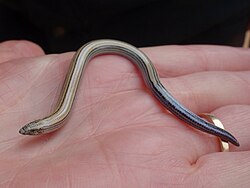Biology:Typhlacontias brevipes
| Typhlacontias brevipes | |
|---|---|

| |
| Scientific classification | |
| Domain: | Eukaryota |
| Kingdom: | Animalia |
| Phylum: | Chordata |
| Class: | Reptilia |
| Order: | Squamata |
| Family: | Scincidae |
| Genus: | Typhlacontias |
| Species: | T. brevipes
|
| Binomial name | |
| Typhlacontias brevipes FitzSimons, 1938
| |
| Synonyms[2] | |
| |
Typhlacontias brevipes, also known as FitzSimon's [sic] burrowing skink[3] or short blind dart skink,[2] is a species of skink endemic to the Namib Desert (Namibia).[2][3] It was described by Vivian FitzSimons in 1938.[2]
Etymology
The species name is derived from the Latin words brevis, -e = short and pes, pedis = foot.[2]
Description
These slender skinks have small eyes with no eyelids and no external ear openings.[3] The hindlimb rudiments are visible on either side of cloaca.[2] The body coloration varies from light buff to sulphur yellow. Vague stripes, formed by the scales, can occur along the back and upper flanks. The tail is blue-grey. They can reach a snout–vent length of 113 mm (4.4 in).[3]
Females are viviparous and give birth to up to three young.[3]
Ecology
Typhlacontias brevipes typically occur on the leeward side of dunes in the roots of grass tufts found in semi-stable sand. They are active at night and in the cooler hours of the day when they forage for small insects like ants, termites, antlions, and beetles.[3]
References
- ↑ Bauer, A.M.; Becker, F. (2020). "Typhlacontias brevipes". IUCN Red List of Threatened Species 2020: e.T44979509A44979514. doi:10.2305/IUCN.UK.2020-3.RLTS.T44979509A44979514.en. https://www.iucnredlist.org/species/44979509/44979514. Retrieved 18 November 2021.
- ↑ 2.0 2.1 2.2 2.3 2.4 2.5 Typhlacontias brevipes at the Reptarium.cz Reptile Database. Accessed 7 September 2020.
- ↑ 3.0 3.1 3.2 3.3 3.4 3.5 "FitzSimon's burrowing skink". Cardboard Box Travel Shop - Namibia. https://namibian.org/travel/reptiles/skinks/fitzsimons-burrowing-skink.html. Retrieved 7 September 2020.
External links
Photographs available at:
Wikidata ☰ Q5127911 entry
 |


